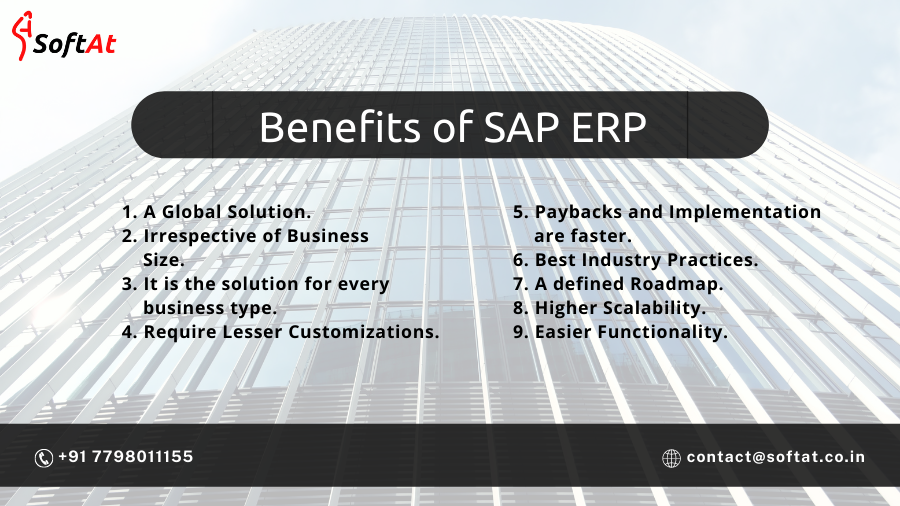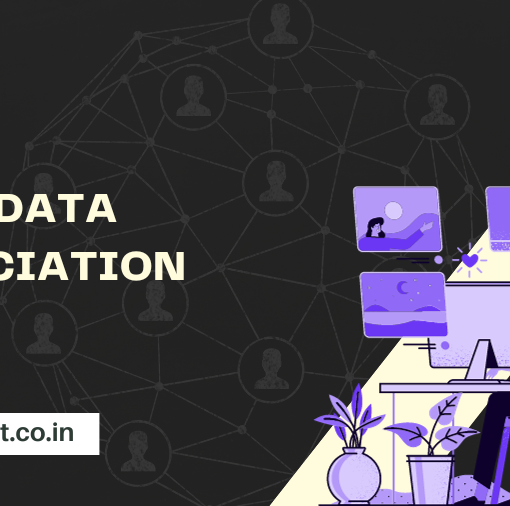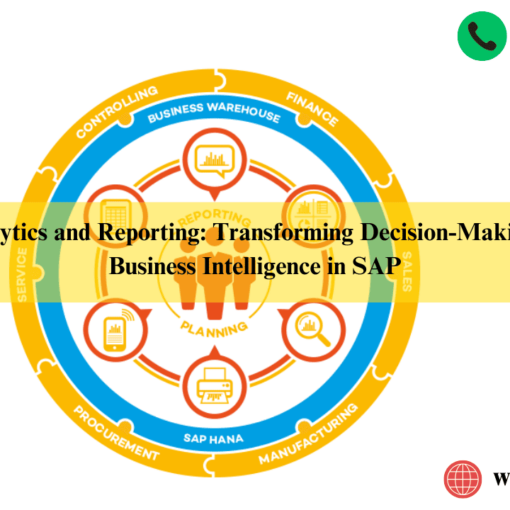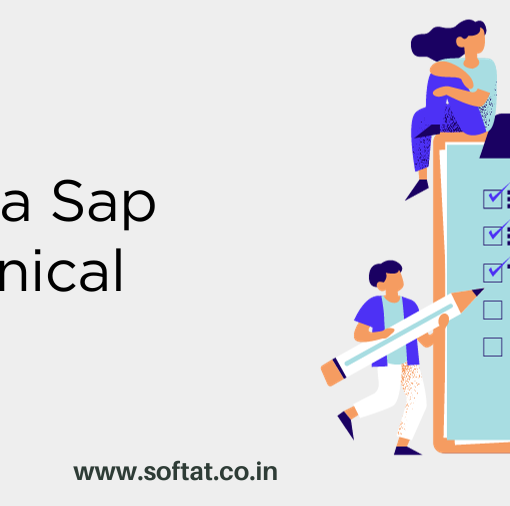What is ERP?
What Is ERP?
Short for enterprise resource planning, ERP is the integrated management of all essential business processes, from inventory and order management to customer relation management. Benefits of SAP ERP. Integrating these business processes into one holistic system allows ERP to streamline information and processes throughout all subsets of an organization.
ERP is a kind of software system that helps you run your entire business, including processes in finance, manufacturing, supply chain, services, procurement, and more.
Employees across different divisions can also expect consistent information, as they share one central ERP database, as well as synchronized reporting and automation.
Types of ERP’s
There are many different ERP systems to choose from.
- SAP B1, R/3, and S/4HANA.
- Oracle Cloud ERP.
- Brightpearl.
- NetSuite ERP.
- Microsoft Dynamics 365 and GP.
- Sage Intacct.
- Epicor ERP.
What are the advantages of ERP
What is SAP?
Founded in 1972, the company was initially called System Analysis Program Development (Systemanalyse Programmentwicklung), later abbreviated to SAP. Since then, it has grown from a small, five-person endeavor to a multinational enterprise headquartered in Walldorf, Germany, with more than 101,000 employees worldwide. With the introduction of its original SAP R/2 and SAP R/3 software, SAP established the global standard for enterprise resource planning (ERP) software. With the introduction of its original SAP R/2 and SAP R/3 software, SAP established the global standard for enterprise resource planning (ERP) software.
What is SAP ERP?
SAP ERP is an enterprise resource planning software developed by the company SAP SE. ERP, or enterprise resource planning, the software is modular software made to integrate the main functions of an organization’s core business processes into a unified system. ERP software will cover all business areas core to an organization by centralizing data management.
ERP systems in general will normally consist of software components, called modules, that each focus on an essential business function, such as finance and accounting, HR, production, materials management and customer relationship management (CRM). Organizations only use the modules they need to run their particular business. Some example business processes include Operations, Corporate Services, Finance and Human Capital Management. ERP software will also allow users to manage customer relationships by department, including in sales, customer service and marketing.
What is the purpose of the SAP ERP system?
The purpose of the SAP ERP (Enterprise Resource Planning) system is to provide a comprehensive and integrated suite of software applications that support various business processes within an organization. SAP ERP is designed to streamline operations, enhance efficiency, and enable data-driven decision-making across different functional areas, such as finance, sales, procurement, manufacturing, human resources, and more.
Here are some key purposes of the SAP ERP system:
- Centralized Data Management: SAP ERP serves as a central repository for storing and managing data from different business functions. It allows for the integration of data across departments, providing a unified view of information and facilitating cross-functional analysis.
- Process Automation: SAP ERP automates and standardizes business processes, reducing manual effort, minimizing errors, and improving efficiency. It provides predefined workflows and rules that guide the execution of tasks, ensuring consistency and compliance with organizational policies.
- Financial Management: The SAP ERP system includes modules for financial accounting, controlling, and treasury management. It enables financial planning, budgeting, and reporting, as well as tracks financial transactions, manages assets, and supports cash management.
- Supply Chain Management: SAP ERP offers functionalities for procurement, inventory management, production planning, and logistics. It helps optimize the entire supply chain, from supplier management to order fulfillment, ensuring smooth operations, reducing costs, and improving customer satisfaction.
- Sales and Customer Relationship Management: The SAP ERP system includes modules for sales order management, customer relationship management (CRM), and marketing. It supports sales processes, tracks customer interactions, manages pricing and promotions, and helps organizations nurture and maintain customer relationships.
- Human Capital Management: SAP ERP provides modules for human resources management, covering areas such as employee administration, payroll, time and attendance, talent management, and workforce planning. It helps organizations effectively manage their workforce, streamline HR processes, and support employee development.
- Reporting and Analytics: SAP ERP offers robust reporting and analytics capabilities, allowing organizations to generate real-time insights, monitor performance, and make data-driven decisions. It provides dashboards, key performance indicators (KPIs), and ad-hoc reporting tools for comprehensive analysis of business data.
- Integration with External Systems: SAP ERP allows integration with other systems, such as customer systems, supplier systems, or third-party applications. This facilitates seamless data exchange, collaboration, and business process integration with external stakeholders.
Overall, the purpose of the SAP ERP system is to enable organizations to effectively manage their resources, optimize business processes, drive operational excellence, and support strategic decision-making, ultimately contributing to improved performance, growth, and competitiveness.
Advantages of SAP ERP
What are the advantages of SAP
1. Visibility and Accessibility of SAP ERP
One of the biggest benefits of SAP ERP is its accessibility. Employees from all departments in the company can access the data stored in the ERP software from any location and from any device.
The fact that the information is stored in a centralized location that is visible and easily accessible to everyone allows for better collaboration between departments. It also makes for more coherent workflows and streamlines task completion. Meanwhile, you can more easily track processes.
The data you’ll be seeing will be complete, accurate, and updated, Therefore, you’ll be able to make decisions quickly and with confidence.
2. Improved Efficiency
The implementation of an SAP ERP solution can significantly reduce the time and effort employees need for completing their day-to-day activities. Moreover, it can reduce or completely eliminate daunting manual processes, thus allowing team members to focus their attention on more important tasks.
In addition, an ERP solution will allow your business to standardize its own systems and processes. This will further enhance efficiency and productivity. And because most processes are automated, errors and costs are significantly reduced.
3. Customizing an SAP ERP System
Nowadays, most SAP ERP vendors offer several applications that you can implement together in accordance with your business’s specific needs. In other words, you can choose the components that work best for your company and leave out those you don’t need.
The manner in which the software is implemented represents yet another aspect of customization. The two major means of deployments are either through a cloud or on your company’s premises.
If you choose to deploy through a cloud, the software will be handled off-site by an SAP ERP provider. However, if you choose to deploy on your own premises, you will need to purchase and install physical software on all your company’s servers and computers.
4. Reduced Costs
Even though ERP software is a substantial investment, it can actually reduce costs in the long run. For example, instead of investing in several different systems that require infrastructure, staff, licenses, and support, you can focus on investing in a single efficient SAP ERP solution. In addition, using a single system reduces training requirements for end users.
5. Improved Collaboration
If you want your business to thrive, you must have strong collaboration between the company’s departments. Of course, this collaboration requires more effort and time. For this reason, teams usually tend to work in silos.
However, using an SAP ERP solution will streamline the process of collaboration by providing employees from all departments with access to the information they need anytime, anywhere.
The fact that data from each department is in a single centralized location makes communication across the entire company much more efficient. This is because every employee can access company data and get a clearer big picture. This in turn enables them to become more engaged and proactive. As a result, overall employee productivity improves.
6. Better Planning and Reporting
Implementing SAP ERP software means your company has a unified reporting system for every process. Because there’s a single source of accurate, up-to-date data, SAP ERP can generate useful analytics and reports at all times and without the help of an IT expert. This allows you to compare and analyze the work of different departments without having to use emails and spreadsheets.
7. Customer Service
The company’s employees aren’t the only ones who will experience the benefits of using an SAP ERP system. Your clients will benefit from it, too. Because client information is streamlined and centralized, your sales reps will be able to focus on building quality relationships with customers instead of constantly working on spreadsheets.
By tracking customer data, your marketing team can get clear insights, improve interactions with customers, and focus on designing more targeted marketing campaigns.
8. Data Quality and Security
One of the most important benefits of using an SAP ERP solution is data security. Both cloud-based and on-premises ERP software offer a high degree of security.
Sharing data across different departments improves collaboration throughout the company. However, SAP ERP solutions also offer intrinsic controls that enable you to limit who can share and see data, thus ensuring its security. In addition, the database system enables centralized backups of sensitive and critical data.
9. Easy Scalability
To ensure success for your business, you need to think and plan for the future. Businesses that fail to prepare for the future often face problems that can become major setbacks.
Implementing an SAP ERP solution means having a system that can adjust to your company’s growth easily and efficiently. Whether you are entering a new market or expanding your customer base, SAP software will ease the transition. Also, if you’re introducing new products, processes, or departments, you’ll be able to add new users or functionalities to an SAP ERP software easily. Just be sure your SAP ERP vendor understands your intentions for future growth.
Advantages of SAP ERP over others
The business of Enterprise Resource Planning is on a continuous high.
The technology and enterprise mobility solutions utilized in the functioning of a business are based on ERP. Everything related to the company’s products, product manufacturing, its sales have come under ERP. These features of a business need consistency of performance in order to gain visibility and identity in the market.
The company’s efficiency and productivity can multiply with ERP solutions. Your company can rise and become competitive. With this emerging business, there are many aspects and people that observe changes in their functionality. It allows the workers to get a great salary package. With the integration of software, the clients can benefit and the customers get a better user interface. Although there is many Enterprise Resource Planning software, SAP software solutions have recurrently been found as the most fruitful in terms of integration and simplification.
Through this article, we can learn in detail how SAP id different and better from other ERP software solutions.
1. A Global Solution.
2. Irrespective of Business Size.
3. It is the solution for every Business type.
4. Require Lesser Customizations.
5. Paybacks and Implementation are faster.
6. Best Industry Practices.
7. A defined Roadmap.
8. Higher Scalability.
9. Easier Functionality.
Conclusion
There are many choices in ERP software ranging from Microsoft, Oracle, PeopleSoft to SAP. But, we have provided pointers that make it pretty clear that SAP software solutions are much better than other ERP software solutions. Business operations ranging from financing, human resources to other operations integrate well with one another and every process gets simplified





